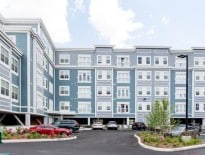
A 61-unit affordable housing complex on Charlestown’s Rutherford Avenue mixes income-restricted units with those reserved for people with developmental disabilities under a new housing model by Toward Independent Living and Learning Inc.
Since its founding in 1980, Toward Independent Living and Learning (TILL) Inc. has been known, and praised, for the small group homes it runs for those with developmental disabilities across eastern Massachusetts – and today the nonprofit operates 53 such facilities in the region.
But last decade TILL renovated an old furniture store in downtown Chelsea, creating a mixed-use facility with 23 apartments for lower-income residents and two apartments for the developmentally disabled, a marked departure from its past practice of owning and running group homes with only four to five bedrooms each for the developmentally disabled.
Now the organization has gone one step further, building from scratch the new mixed-use Bridgeview Center in Charlestown. The four-story structure contains 61 apartments for low-income residents, a group home of five bedrooms for those with developmental disabilities within the center and 8,400 square feet of commercial space occupied by an insurance agency and pharmacy. The 76,698-square-foot Bridgeview, which opened early this year, is now near full occupancy.
So is TILL changing its client focus and business model, opting for large-scale mixed-use residential projects over smaller group homes?
Not at all, organization officials say. The mission remains the same, whether it’s small group homes tucked into neighborhoods or larger multifamily facilities like those in Chelsea and Charlestown, which are sort of neighborhoods within themselves. The integration of the developmentally disabled into society, letting them live alongside others, and not isolating them in hospital-like settings that used to be the norm before deinstitutionalization of what used to be called “centers for the mentally retarded.”
“Segregated, single-purpose settings don’t allow all people to learn from one another and enjoy the benefit of diverse abilities and backgrounds,” said Dafna Krouk-Gordon, president of TILL. “The unique aspect of this building and the philosophy behind all of our residential development is based on the concept of inclusiveness, diversity and creating ways to naturally fit into the larger environment.”
Kevin Stock, TILL’s vice president of finance, said both the Chelsea and Charlestown complexes were the result of unique opportunities for TILL – and not a sign that the organization is changing its focus to larger multifamily facilities.
Badly Needed Housing
This much is clear: Bridgeview Center is an impressive facility, located at 330 Rutherford Ave. near Sullivan Square and Bunker Hill Community College. Besides its affordable apartments, commercial space and group home within the center, Bridgeview also has a 65-space underground garage.
Built on vacant property long owned by the city of Boston, the wood-frame Bridgeview Center with a modular-brick exterior was financed via a number of public sources and private investors via federal low-income tax credits.
The Massachusetts Housing Partnership, a quasi-state agency, provided $3.9 million in financing to cover the project’s construction costs.
Clark Ziegler, MHP’s executive director, said his organization couldn’t be happier with the outcome.
“They have a very strong reputation,” Ziegler said TILL. “They’ve done a great job.”
For MHP, the project represents construction of badly needed new housing in the area, whether it’s affordable rental housing for low-income residents or group-home bedrooms for those with developmental disabilities.
“Every single unit helps,” Ziegler said of the need for more housing in general in Greater Boston. “If those (with developmental disabilities) didn’t have the center, they’d be housed in already existing buildings. This helps.”
While Bridgeview Center’s group home is run by TILL, the center’s low-income apartments are overseen by Trinity Management, a private property management company, Stock said. The subsidized one-, two- and three-bedroom units lease from approximately $900 to $1,500 a month.
As of mid-November, only one vacant apartment remained at Bridgeview, which received 1,800 applications from prospective tenants. The overwhelming response reflects the ever-increasing demand for income-restricted housing in Greater Boston, Stock said.
As for those living in Bridgeview’s group home, they interact every day with residents, living on the second floor right in the middle section of the complex.
“That’s what we’re about: integration,” Stock said.
Email: jayfitzmedia@gmail.com








